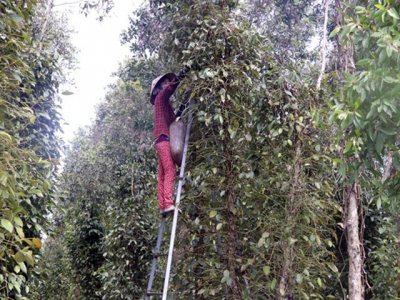Cajuput tree trellises used to grow pepper

KIÊN GIANG — Farmers in Kiên Giang Province’s Gò Quao District are using environmentally-friendly cajuput trees as trellises instead of concrete or wooden pillars to grow pepper plants.
Harvesting pepper in Kiên Giang Province’s Gò Quao District. – VNA/VNS Photo Lê Huy Hải
Most of the Cửu Long (Mekong) Delta district’s 250ha of pepper are using cajuput trees, saving costs for farmers.
Nguyễn Anh Vũ, who has planted pepper with the trees in Gò Quao’s Vĩnh Hòa Hưng Bắc Commune for 14 years, said widespread use of the trees began in 2000.
Many farmers are also growing pepper under Vietnamese good agricultural practices (VietGAP) standards and organic standards.
The district has 20ha of pepper meeting VietGAP standards and 11.8ha of organic pepper meeting US, Japanese and EU standards.
The Phú Quốc Biology Nature Limited Company, Gò Quao District agricultural authorities and a co-operative team of 12 households in Vĩnh Hòa Hưng Bắc and Vĩnh Hòa Hưng Nam began the organic pepper model in 2017.
Võ Đức Huy, director of the company, said the growing of organic pepper had increased profits for farmers, and created more hygienic plants which are exported to the US and Germany.
Farmers who grow organic pepper are guaranteed a price of VNĐ30,000 (US$1.3) a kilo higher than the market price, he said.
Organic pepper sells for VNĐ80,000 ($3.4) a kilo.
Phan Văn Khang, who grows 2ha of organic pepper in Vĩnh Hòa Hưng Nam Commune, said: “Organic pepper develops well and is less susceptible to diseases compared to traditionally planted pepper.”
The company has taught households how to grow organic pepper, and use organic fertiliser and bio-products.
He harvested more than 6 tonnes of pepper in the harvest season and earned a profit of VNĐ520 million ($22,200).
Planting organic pepper has many benefits, including improving the fertility of soil and increasing the number of good microorganisms in the soil, according to farmers.
Dương Duy Duyệt, deputy head of the district’s Agriculture and Rural Development Bureau, said: “Based on this success, the district will continue to co-operate with the company to expand organic pepper growing area.”
The district would also continue to offer advanced farming techniques for farmers to grow organic pepper, he said.
This year, the district increased the organic pepper growing area by 10ha and plans to have 100ha of organic pepper in the future.
Pepper is a priority product for development in the province.
Có thể bạn quan tâm
 Traditional craft in Thanh Hoa yearns for golden age
Traditional craft in Thanh Hoa yearns for golden age A number of traditional craft makers in the north-central coastal province of Thanh Hoa, including Nga Son’s sedge mats and Tho Xuan’s matting sedge
 How Free State maize farmer survived the drought
How Free State maize farmer survived the drought Sabrina Dean visited maize farmer AC van Wyk on his farm in the Free State, to gain some insight into how an award-winning farmer tackles a difficult planting
 New Zealand holds workshop to boost Vietnam’s dragon fruit exports
New Zealand holds workshop to boost Vietnam’s dragon fruit exports The Ho Chi Minh City-based workshop last week was New Zealand’s latest effort to improve the fruit production chain in Vietnam.